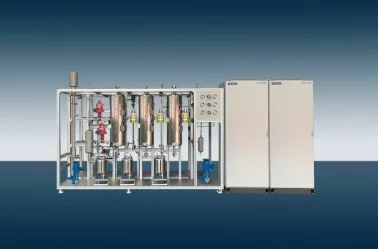Common Problems in Fixed-Bed Pilot Scale Units: Solutions
Fixed-bed pilot scale units play a crucial role in process development, testing, and scaling up chemical operations. These units provide a controlled environment where engineers and researchers can simulate industrial-scale processes before full-scale implementation. However, despite their importance, fixed-bed reactors often encounter a range of challenges that can affect the quality of results and the efficiency of operations.
In this blog post, we’ll explore some of the common problems that arise in fixed-bed pilot scale units and provide effective solutions to address them. We’ll also highlight how Chem-Unit Technologies Co. Ltd., a leading provider of skid-mounted test rigs, pilot-scale units, and production systems, can help mitigate these issues with advanced technology and innovative solutions.
Channeling and Uneven Flow Distribution
Channeling is one of the most common problems faced in fixed-bed reactors. It occurs when the fluid bypasses the bed of particles and flows preferentially through a specific path. This leads to uneven flow distribution, which compromises the efficiency of mass transfer and catalytic reactions.
Solution: To combat channeling, it's important to optimize the bed design. Incorporating features like distributor plates or optimized packing material can help ensure uniform flow distribution. Additionally, maintaining proper bed integrity and preventing bed compaction are key factors in minimizing channeling.
Chem-Unit Technologies Co. Ltd. designs pilot-scale units with highly customizable flow distributors and ensures that the bed is uniformly packed, allowing for better flow distribution and more consistent performance during the testing phase.
Clogging or Blockages
In a fixed-bed system, clogging can occur when solid particles accumulate and block the flow of reactants through the bed. This can significantly reduce the flow rate and increase pressure drop, which can alter the results of experiments.
Solution: To prevent clogging, regular monitoring and maintenance are essential. Installing filters at the inlet and outlet of the reactor can help capture large particles before they enter the bed. Furthermore, designing the bed to withstand higher pressure drops can prevent the buildup of material within the reactor.
Chem-Unit’s fixed-bed units are equipped with advanced filtration systems and clogging detection mechanisms, ensuring smooth operation and minimizing the risk of blockage.

Temperature Gradient Issues
In many catalytic processes, temperature gradients within the fixed-bed reactor can affect the reaction rate and product quality. A large temperature difference across the bed can lead to incomplete reactions or unwanted side reactions, especially in exothermic processes.
Solution: To minimize temperature gradients, precise temperature control and uniform heating are necessary. Using multiple temperature sensors throughout the bed and implementing effective heat management systems can help maintain a consistent temperature profile.
Chem-Unit Technologies incorporates sophisticated heating systems and temperature control mechanisms in its pilot-scale units, ensuring uniform temperature distribution throughout the bed for optimal reaction conditions.
Pressure Drop Variations
A fixed-bed reactor can experience significant pressure drops due to factors such as bed compaction, uneven flow, or clogging. High pressure drops can lead to increased operational costs and reduced system efficiency.
Solution: To reduce pressure drop, it is crucial to optimize the packing density and particle size distribution within the bed. This ensures that the flow is evenly distributed and minimizes resistance. Additionally, regular checks for bed compaction and wear can help in maintaining the pressure drop within acceptable limits.
At Chem-Unit Technologies, each pilot-scale unit is carefully engineered to maintain optimal pressure drop levels, ensuring consistent performance and reliability throughout the testing phase.

Inadequate Mass Transfer
Mass transfer limitations can lead to inefficient reactions in fixed-bed reactors, particularly when dealing with complex reactions or multi-phase systems. Inadequate mass transfer can result in poor conversion rates, lower yields, and increased operating costs.
Solution: Enhancing the mass transfer efficiency requires optimizing bed configuration, selecting appropriate packing materials, and ensuring proper fluid dynamics. This might involve altering the particle size, improving the flow rate, or even using special coatings to improve contact between phases.
Chem-Unit Technologies offers highly customizable pilot-scale units that can be fine-tuned to optimize mass transfer, ensuring that both gas and liquid phases interact efficiently with the catalyst or the bed material.
Scaling Challenges
Scaling up from laboratory-scale reactors to pilot-scale systems can lead to unexpected issues due to differences in flow patterns, temperature profiles, or reaction kinetics. These discrepancies can affect the scalability of processes and lead to suboptimal performance at larger scales.
Solution: Careful process modeling and simulation can help identify potential scaling issues before they occur. Pilot-scale units should be designed to replicate as closely as possible the conditions expected at full scale, using scaled-up reactors that mimic the industrial environment.
Chem-Unit Technologies provides a range of pilot-scale solutions that ensure accurate simulation of full-scale production, allowing for a smooth transition from pilot testing to industrial-scale implementation.

Conclusion
Fixed-bed pilot-scale units are essential for optimizing chemical processes and ensuring that new technologies are scalable and efficient. However, like any complex system, they come with their own set of challenges. By addressing issues such as channeling, clogging, temperature gradients, pressure drops, mass transfer limitations, and scaling difficulties, engineers can optimize reactor performance and achieve more reliable results.
Chem-Unit Technologies Co. Ltd. understands these challenges and offers advanced pilot-scale solutions designed to tackle these common problems. Their expertise in designing skid-mounted test rigs and pilot-scale units ensures that businesses can achieve smooth, efficient, and reliable testing for process development.
By working with experienced providers Chem-Unit Technologies, companies can reduce operational risks, improve performance, and scale their processes more effectively, ultimately saving time and money while improving product quality.
Exploring the Advantages of Fixed-Bed Pilot Scale Units in Industrial Applications
- Образование
- Course
- Books
- Drawing
- Раздел
- Film
- Fitness
- Food
- Игры
- Gardening
- Health
- Главная
- Literature
- Music
- Networking
- Другое
- Programming
- Religion
- Shopping
- Sports
- Curriculm
- Wellness


